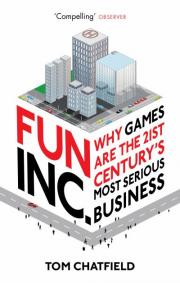REVIEW: The big-time economics of video gaming
Tom Chatfield admits he loves computer games and may therefore be shamelessly  partisan in his book “Fun Inc., Why Games are the 21st Century’s Most Serious Business.”
partisan in his book “Fun Inc., Why Games are the 21st Century’s Most Serious Business.”
But he is not just your average IT guy bitching about how nobody in the office reboots before calling tech support, or flaming newbies on forums with RTFMs.
He has a doctorate from Oxford, for heaven’s sake. His opinions on computer games are regarded highly enough that he’s been published in Wired, The Sunday Independent and The Observer, and has even addressed the British House of Commons.
Chatfield introduces his book by explaining that the current term for describing a player of computer games — gamer — will very soon be obsolete. With over 80 per cent of the U.S. population already playing some form of computer game or another in 2009 according to the National Gamers Survey, he says there will no longer be a need to distinguish gamers from everybody else because everybody will be playing them.
Games, he says, have moved from being the domain of young, socially-awkward males to now being enjoyed by almost all demographics. Their increasing popularity is only partly due to improvements in graphics, he says. Much of it is due to the imagination of game writers in producing virtual worlds with ever-expanding opportunities for players to quench their natural curiosity to explore.
They’re also much more social than the early days. Thanks to the Internet, players can communicate, organize, and even form lasting friendships. He eloquently describes how some of his most treasured gaming moments involve playing versions of the popular Vice City series in a room full of friends, hooting and taking joy in each other’ successes, failures and antics.
Chatfield is particularly good when he takes issue with the notion that games encourage anti-social behavior because they lack real-world consequences. Players of online games, he points out, must follow standard social etiquette or risk no one wanting to play with them. Guilds, which are organized groups of players who unite to achieve goals within a game, require leaders with the ability to get large groups of disparate people to work for a common good.
Chatfield notes that a Harvard Business Review article even suggested that guild leader status might be a better qualification to run an Internet startup company than an MBA.
The problem with the book, though, is that Chatfield takes a step beyond mere partisanship and into fanaticism.
For instance, the notion that everybody will one day be playing computer games seems a tad delusional, particularly when there exists pockets of young, hip, exceptionally tech-savvy people who don’t do Call of Duty, don’t Farm ville, and don’t even Tetris. Game aficionados believe this is simply a case of anti-gamers not having encountered the game that will convert them yet, but this sounds an awful lot like the Communist on the corner, or the North American soccer fan, claiming the revolution is imminent.
Chatfield is also extremely quick to dismiss the problem of addictive gaming. “You can lose time to games, but it’s extremely difficult to lose your health or your wealth to them,” he states.
Who does he think he’s fooling? Hands up if you don’t know someone who has stayed up all night, eaten nothing but pizzas, lost their job, not looked for a new job, missed paying rent and had to move back in with their parents because of an out-of-control online gaming addiction. Anyone? Anyone?
Computer games are undeniably a social force and present all sorts of opportunities for social good. Chatfield himself explains that he’s even had guests stay at his home in England who he’s met through playing one of the world’s most popular online games, World of Warcraft.
But not knowing anti-gamers exist, and that addicts suffer more serious consequences than simply staying up too late, suggests Chatfield might want to spend a little more time in the real world instead of the World of Warcraft one.
Incidentally, Chatfield notes that World of Warcraft is often called WoW by users. But he doesn’t note that many players, including some of its most dedicated ones, also call it World of Warcrack.













